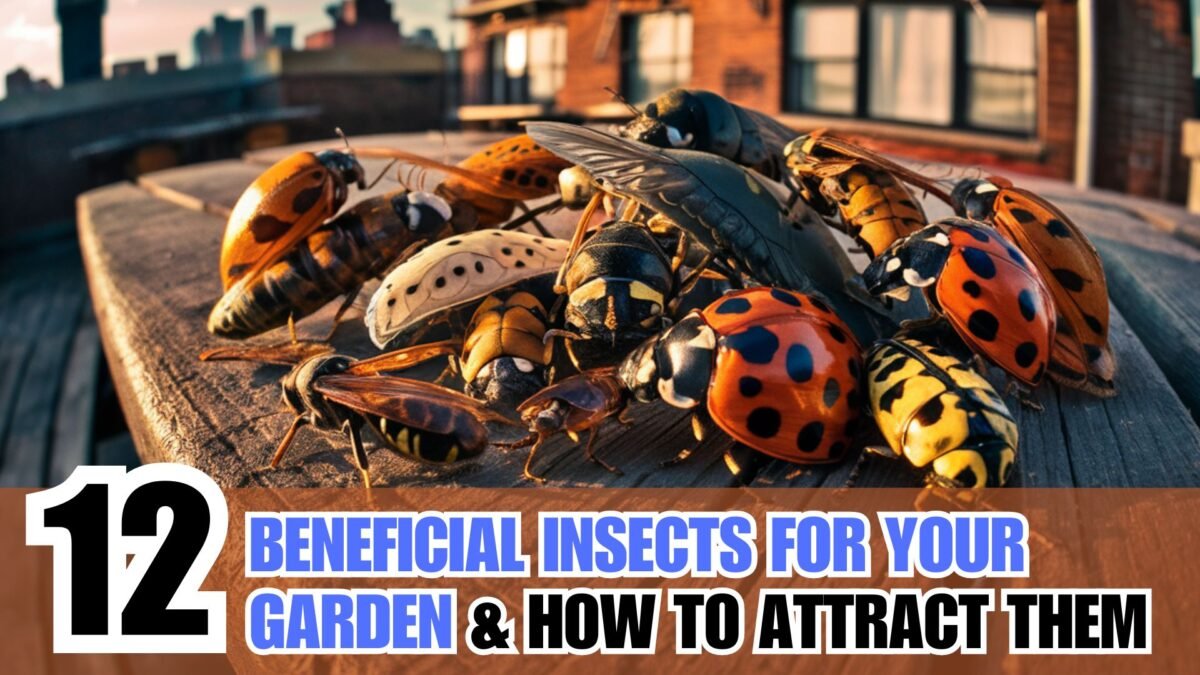In this ultimate guide to “Beneficial Garden Insects,” you’ll unlock the power of nature’s own pest control forces.
Attract and nurture these 12 incredible insects, and watch your survival garden thrive without harsh chemicals.
Key Takeaways:
- Learn about the top 12 beneficial insects for your garden, including ladybugs, lacewings, and parasitic wasps.
- Discover effective strategies to attract and sustain these natural pest controllers in your survival garden.
- Understand the numerous benefits of incorporating beneficial insects into your gardening ecosystem.
- Avoid common mistakes that can harm or repel these helpful creatures from your garden.
By harnessing the power of beneficial garden insects, you’ll cultivate a healthier, more productive, and sustainable survival garden while embracing eco-friendly practices.
For more tips on natural pest control, check out our guide.
Table of Contents
Introduction to Beneficial Garden Insects
Beneficial insects play a crucial role in maintaining a healthy and productive survival garden. These creatures naturally prey on or parasitize common garden pests, helping to control their populations without the need for harsh chemicals. Encouraging beneficial insects in your garden can lead to a more sustainable and environmentally-friendly approach to pest management.
Some key benefits of having beneficial insects in your survival garden include:
- Natural pest control, reducing the need for harmful pesticides
- Improved plant health and yield
- Increased biodiversity and a balanced ecosystem
Common examples of beneficial insects include ladybugs, lacewings, parasitic wasps, praying mantids, and ground beetles, among others. By understanding their roles and how to attract them, you can create a thriving, self-sustaining survival garden. For more on beneficial garden bugs, check out our comprehensive guide.
12 Beneficial Insects to Attract
Incorporating a diverse range of beneficial insects into your survival garden can provide a comprehensive line of defense against various pests and ensure a healthy, productive growing environment. Here are 12 beneficial insects to consider attracting:
Ladybugs/Ladybirds
Ladybugs are one of the most well-known and effective beneficial insects for gardeners. These voracious predators feed on aphids, mealybugs, mites, and other soft-bodied pests, helping to keep their populations in check. Both the adults and larvae consume large quantities of pests, making them valuable allies in your survival garden.
Lacewings
Lacewings, with their distinctive green bodies and lacy wings, are highly effective predators of aphids, mealybugs, whiteflies, and other small insects. Their larvae, often referred to as “aphid lions,” have a ferocious appetite and can consume hundreds of pests during their development.
Parasitic Wasps
Despite their intimidating name, parasitic wasps are harmless to humans and beneficial for controlling a wide range of garden pests. These tiny wasps lay their eggs inside or on the bodies of pest insects, such as caterpillars, aphids, and beetle larvae, ultimately killing the host.
Praying Mantis
The iconic praying mantis is a formidable predator in the garden, feeding on a variety of insects, including moths, beetles, and even larger pests like grasshoppers. Their impressive hunting skills and voracious appetite make them valuable allies in controlling pest populations.
Predatory Mites
Predatory mites, though tiny, are fierce hunters of even smaller pests like spider mites, thrips, and other mite species that can damage plants. These beneficial mites can be introduced to your garden or encouraged by providing suitable habitats and conditions.
Ground Beetles
Ground beetles are nocturnal hunters that prowl the soil surface and leaf litter, preying on various soil-dwelling pests, such as cutworms, root maggots, and slugs. Their presence in your survival garden can help protect your plants’ roots and stems.
Tachinid Flies
Tachinid flies are parasitic flies that lay their eggs on or near other insects, primarily caterpillars and beetle larvae. As the fly larvae develop, they consume the host from the inside, effectively controlling pest populations.
Pirate Bugs
Pirate bugs are skilled predators that feed on a wide range of garden pests, including aphids, thrips, and spider mites. Their strong, piercing mouthparts allow them to effectively subdue and consume their prey.
Damsel Bugs
Damsel bugs, also known as nabids, are fierce predators that feed on various soft-bodied insects, such as aphids, leafhoppers, and caterpillars. Their unique hunting techniques and appetite make them valuable additions to your survival garden.
Spiders
While not insects, spiders are important predators in the garden ecosystem. These web-builders and hunters help control populations of flies, moths, and other flying insects that can potentially damage your plants.
Braconid Wasps
Braconid wasps are tiny parasitic wasps that lay their eggs inside or on the bodies of various insect pests, including caterpillars, aphids, and beetle larvae. As the wasp larvae develop, they consume the host from the inside, effectively controlling pest populations.
Soldier Beetles
Soldier beetles are beneficial insects that feed on a variety of garden pests, including aphids, caterpillars, and other soft-bodied insects. Their presence in your survival garden can help maintain a balanced ecosystem.
For a more comprehensive look at beneficial garden insects, be sure to check out our in-depth guide on plants that repel pests.
| Beneficial Insect | Primary Prey | Additional Benefits |
|---|---|---|
| Ladybugs | Aphids, mealybugs, mites | Effective at all life stages |
| Lacewings | Aphids, mealybugs, whiteflies | Larvae are voracious predators |
| Parasitic Wasps | Caterpillars, aphids, beetle larvae | Host-specific, minimizing non-target impact |
| Praying Mantis | Moths, beetles, grasshoppers | Impressive hunting abilities |
| Predatory Mites | Spider mites, thrips, other mites | Effective control of hard-to-reach pests |
| Ground Beetles | Cutworms, root maggots, slugs | Protect plant roots and stems |
| Tachinid Flies | Caterpillars, beetle larvae | Parasitic control of pests |
| Pirate Bugs | Aphids, thrips, spider mites | Wide range of prey |
| Damsel Bugs | Aphids, leafhoppers, caterpillars | Skilled hunters |
| Spiders | Flies, moths, other flying insects | Effective web-builders and hunters |
| Braconid Wasps | Caterpillars, aphids, beetle larvae | Parasitic control of pests |
| Soldier Beetles | Aphids, caterpillars, soft-bodied insects | General predators |
How to Attract Beneficial Insects
Attracting beneficial insects to your survival garden requires providing the right conditions and resources to encourage their presence and reproduction. Here are some effective strategies to consider:
Provide Food Sources
Beneficial insects require food sources to thrive in your garden. Consider the following:
- Plant flowering herbs and plants: Provide a continuous supply of nectar and pollen by planting a variety of flowering herbs and plants, such as dill, fennel, coriander, and yarrow. For more ideas, check out our guide on attracting pollinators to your garden.
- Offer alternative prey: Some beneficial insects may need alternative prey sources, like aphids or mealybugs, to sustain their populations until pests arrive.
- Create insectary strips: Dedicate a section of your garden specifically for planting nectar-rich flowers and herbs to attract and sustain beneficial insect populations.
Create Shelter/Housing
Many beneficial insects require suitable shelter or housing to complete their life cycles. Consider the following options:
- Insect hotels or houses: Construct or purchase insect hotels or houses made from natural materials like bamboo, wood, or reeds. These provide nesting sites for bees, lacewings, and other beneficial insects.
- Leave areas undisturbed: Maintain areas of your garden with leaf litter, logs, or rock piles, which can provide shelter for ground-dwelling beneficial insects like ground beetles and spiders.
- Provide water sources: Shallow dishes or birdbaths with pebbles or rocks can serve as reliable water sources for beneficial insects.
Avoid Pesticide Use
Pesticides, even those labeled as “organic” or “natural,” can harm beneficial insects and disrupt the delicate balance in your garden ecosystem. Whenever possible, avoid using pesticides altogether or use them judiciously and only as a last resort. For alternative pest control methods, check out our guide on organic pest control strategies.
Maintain Diversity
A diverse garden environment with a variety of plant species, heights, and structures will attract and support a wider range of beneficial insects. This diversity creates different microhabitats and food sources, promoting a healthy and balanced ecosystem in your survival garden. Our article on edible landscape tips offers more insights on creating a diverse and productive growing space.
Benefits of Having Beneficial Insects in Your Garden
Incorporating beneficial insects into your survival garden offers numerous advantages:
- Natural pest control: By preying on or parasitizing common garden pests, beneficial insects provide an effective and environmentally-friendly form of pest management, reducing the need for harsh chemical pesticides.
- Improved plant health: With fewer pests, your plants will experience less damage, leading to healthier growth, better yields, and increased resistance to diseases and environmental stresses. For tips on achieving healthy garden soil, check out our comprehensive guide.
- Increased biodiversity: A diverse array of beneficial insects contributes to a balanced ecosystem, promoting a rich and thriving garden environment.
- Sustainable gardening practices: Relying on natural predators and parasites aligns with sustainable and eco-friendly gardening principles, minimizing the impact on the environment and supporting a more resilient garden.
- Cost-effective pest management: Attracting and maintaining beneficial insect populations is a cost-effective approach to pest control compared to purchasing and applying chemical pesticides repeatedly.
By embracing the benefits of beneficial insects, you can cultivate a healthier, more productive, and environmentally-friendly survival garden while reducing your reliance on harmful chemicals.
Common Mistakes to Avoid
While encouraging beneficial insects in your survival garden, it’s essential to avoid common mistakes that could hinder their effectiveness or inadvertently harm them. Here are some pitfalls to be aware of:
- Indiscriminate pesticide use: Pesticides, even those labeled as “organic” or “natural,” can kill or repel beneficial insects along with pests. Use them sparingly and only when absolutely necessary. Our article on common gardening mistakes offers more insights on avoiding detrimental practices.
- Over-tidying the garden: Leaving some areas undisturbed, with leaf litter, logs, or rock piles, provides essential shelter and overwintering sites for many beneficial insects.
- Lack of diversity: A monoculture or lack of plant diversity can limit the food sources and habitats available for different beneficial insect species, reducing their overall effectiveness. Diversify your garden with a variety of vegetables for small spaces.
- Using invasive or non-native plants: Some ornamental plants can be invasive or non-native, disrupting the local ecosystem and potentially harming beneficial insect populations. Stick to native and well-suited plants for your region.
- Overlooking life cycles: Certain beneficial insects, like lacewings and ladybugs, have different dietary needs during their larval and adult stages. Ensure you cater to their entire life cycle by providing diverse resources.
By being mindful of these common mistakes, you can create an environment that is truly welcoming and supportive for beneficial insects in your survival garden.
Conclusion
Encouraging beneficial insects in your survival garden is a sustainable and effective approach to pest management. By providing food sources, shelter, and avoiding harmful pesticides, you can attract a diverse array of natural predators and parasites to protect your plants.
From ladybugs and lacewings to parasitic wasps and ground beetles, these beneficial insects offer a comprehensive line of defense against various garden pests, ensuring healthier plants and better yields.
Embrace the principles of biodiversity, create insectary strips, and maintain a balanced ecosystem in your survival garden. By doing so, you’ll not only enjoy a more productive and resilient growing environment but also contribute to a more sustainable and environmentally-friendly approach to gardening.
For more tips on successful survival gardening, be sure to check out our comprehensive guides on topics like winter gardening techniques, raised bed gardening, and fast-growing vegetables.
Remember, a little effort in attracting and nurturing beneficial insects can go a long way in ensuring a bountiful and thriving survival garden for years to come.


